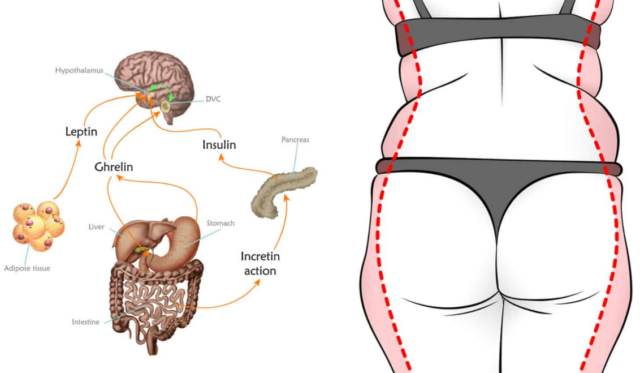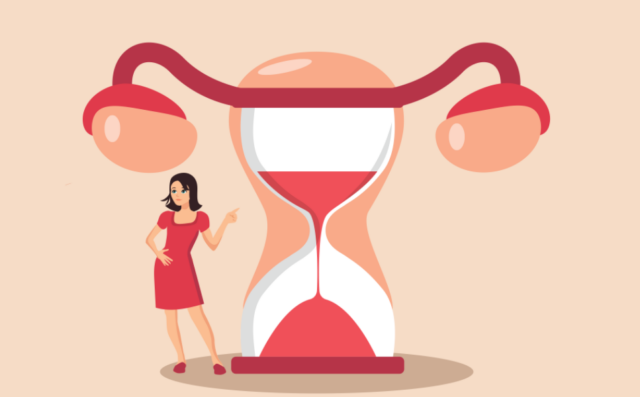
Many factors influence a person when it comes to gaining or losing weight: diet, lifestyle, environment, and, of course, the hormonal changes to which we are subjected throughout our lives. These changes in the levels of our hormones can be caused by the passage of time (our endocrine system does not work the same at 15 years as it does at 60), also by our lifestyle (be it more or less active), by some pathology (such as hyper or hypothyroidism) or even by the consumption of some drugs.
Let’s see how hormones behave throughout our lives and how they promote weight gain or loss!
Hormones and weight changes

Hormones are chemical substances secreted by endocrine glands and regulated by our endocrine system. They act as regulatory “chemical messengers” for many of the processes that occur in our body and transmit signals from one cell to another through blood flow. All living things, including animals and plants, secrete hormones, and these are in a delicate balance.
Sometimes the changes can be due to a hormonal imbalance. This imbalance can occur throughout the stages of life and can be a normal physiological phenomenon, although, as we have said, it can also be caused by some diseases or by some drugs such as those used to control hypertension, antidepressants, and medications to control diabetes or even the birth control pill.
Adolescence
One of the periods of our lives in which we experience more physical changes is that of adolescence: both men and women reach sexual maturity at this stage through changes in the segregation of hormones.
During adolescence, there is an increase in body fat in both sexes, although in the case of women this occurs more quickly and more localized, and it tends to accumulate both in the upper part of the trunk and in the upper extremities and the upper part of the thighs. It is the result of a woman’s body beginning to produce more estrogen and progesterone and preparing for a possible pregnancy.
During adolescence, men also begin to produce more testosterone on their way to sexual maturity, but unlike women, they gain more muscle mass (and less fat mass), leading to a minor weight gain.
Menopause

Another of the stages of life in which we suffer more hormonal changes, this time in the case of women, is menopause. Menopause is the name given to the stage in which menstruation permanently disappears and which entails a series of physiological changes, including a decrease in estrogen production that can lead to hormonal imbalances and weight gain. Along with the decrease in estrogen, there are also other hormonal changes in this stage, such as the decrease in leptin secretion (a hormone related to appetite regulation), the lower presence of beta-endorphins (related to the rewarding effect that food has on our brain) and the change in circadian or sleep-wake cycles.
Andropause
As we have seen previously, hormonal changes and imbalances are not something exclusive to women: men also suffer from them throughout their lives. In the case of men, and although many are unaware of it, after forty years of age they usually enter a stage very similar to menopause in women, which is called andropause. During this stage, there is a gradual slowdown in the secretion of hormones, especially testosterone. This drop-in testosterone and its imbalance with estrogen (which men also produce but in lesser amounts) make the body more favorable to fat accumulation and, therefore, excess weight.
During all stages of life, we suffer hormonal changes that can lead us to gain or lose weight: the best way to control it is to maintain an active lifestyle in which exercise is part of our daily life, and to follow a diet balanced and without excesses, according to our energy needs.
What hormones are related to weight gain?
Sometimes, it can be related to a hormonal imbalance, which can be triggered by very restrictive diets, stress problems, or simply because there is a genetic factor. In any case, it is always advisable to go to a specialist to determine, through a medical test, our hormone levels. The most normal thing is that “the gain” is due to bad eating habits and lack of exercise, which means that they will simply have to reorganize their meals, eat a balanced diet, and play sports, at least 4 hours a day. However, there are cases in which the reasons are more complex.
Maintaining certain bad eating habits for a long time, such as following very restrictive or high-protein diets, stress, or simply due to a genetic or age-related factor can trigger a hormonal imbalance that would cause weight gain. Here are some related hormones:
Thyroid
There is a close relationship between thyroid hormones and weight regulation and metabolism. The thyroid gland is responsible for the secretion of hormones T3 and T4; if this does not work correctly, there can be an underproduction or an overproduction of these hormones, giving rise in the first case to hypothyroidism or, in the second, to hyperthyroidism.
Hyperthyroidism will cause our metabolism to speed up, something that is not healthy and must be regulated with the corresponding medication. On the other hand, hypothyroidism causes our metabolism to slow down, causing a considerable increase in weight and body fat.
Insulin

We all know that insulin is the hormone that regulates blood sugar levels and that if our pancreas does not work properly and does not release enough of this hormone; the disease called diabetes would appear. According to the nutritionist, insulin is not only related to the control of sugar levels but also metabolism and weight loss. Bad habits, such as excess alcohol, sugary drinks, the consumption of pastries and processed foods can end up giving rise to the so-called insulin resistance. This occurs when the body, specifically muscle cells, is unable to recognize insulin bound to glucose and, therefore, it remains in the bloodstream, leading to obesity.
Cortisol: It is also known by the name of “stress hormone”. In addition to controlling carbohydrate, protein, and lipid metabolism, an increase in it causes the accumulation of fat in the abdomen.
Want to know more info about other hormones? Just visit bywinona.com.






